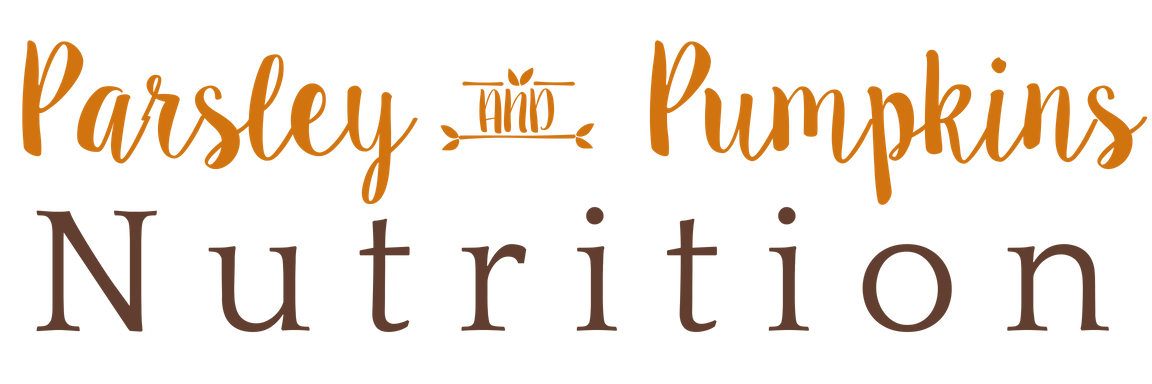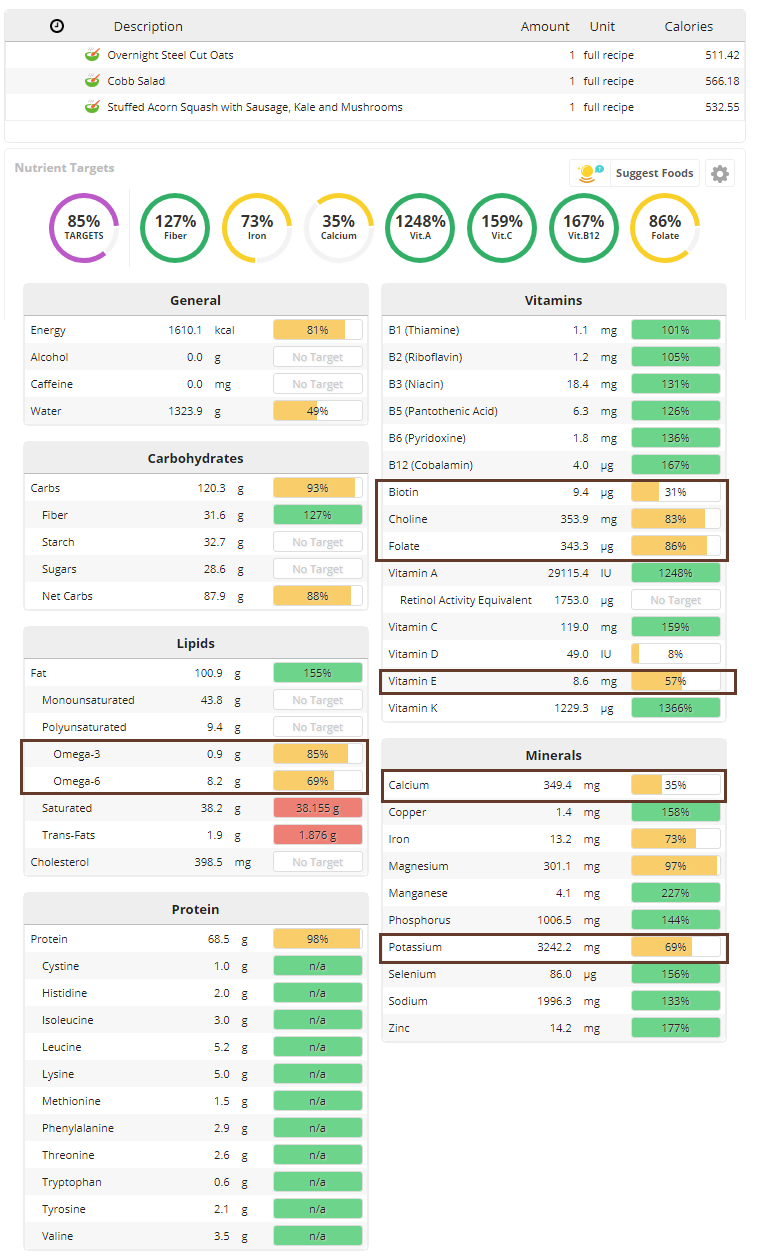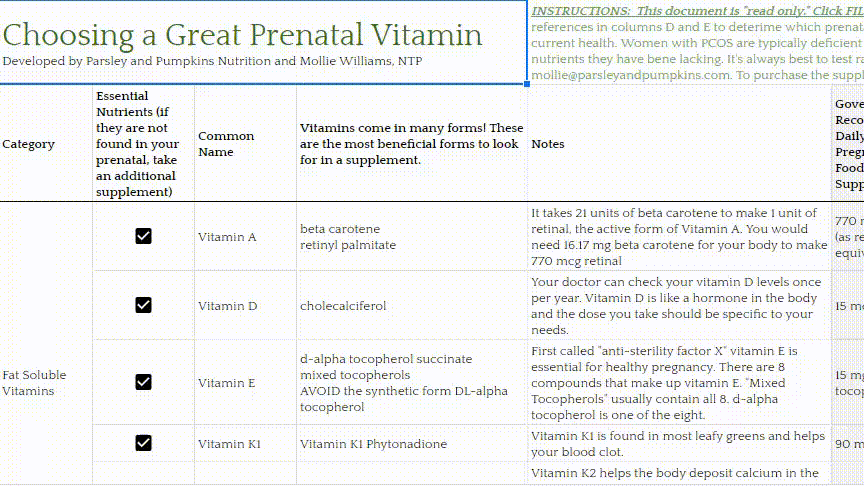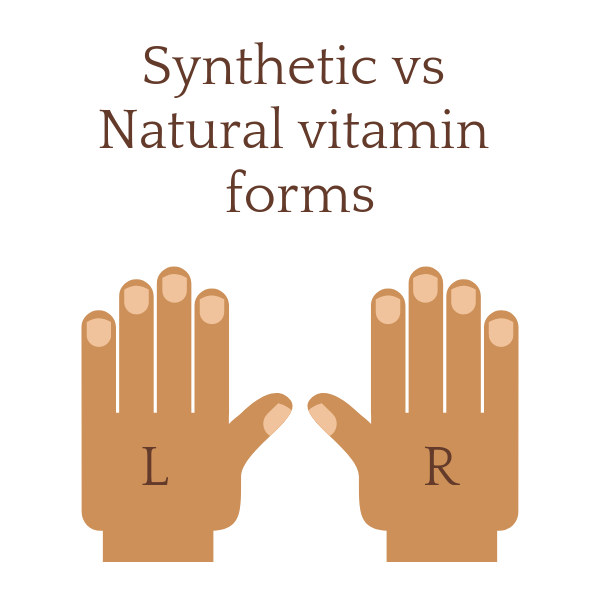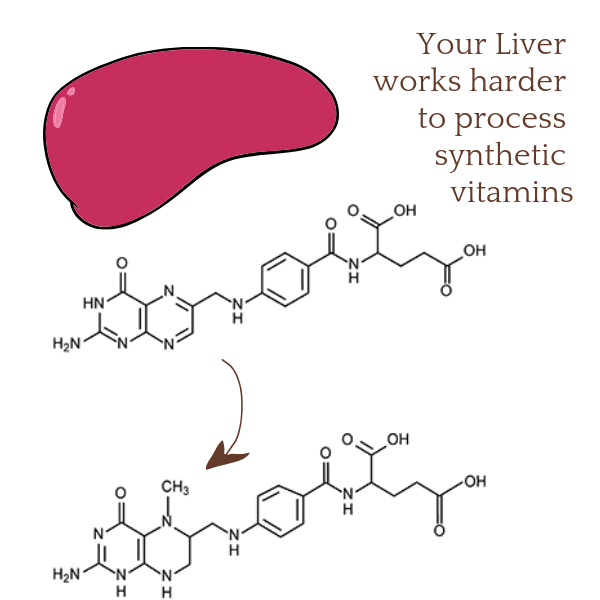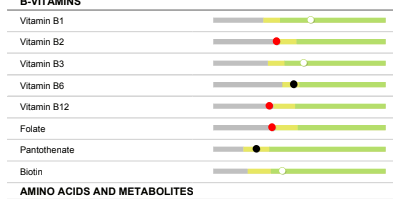The Ultimate Guide to Prenatal Vitamins for PCOS
Get the Prenatal Guide
I’ve created a spreadsheet that you can download that contains all of the nutrients found in prenatals, what they actually do to support fertility, what forms are most beneficial, and there’s a space for you to enter the values of your current prenatal to see how it stacks up.
How to use this article:
This article is in 3 sections to help you get the most out of this topic - quickly and easily.
Identify your nutritional needs
Make sure your prenatal meets your needs
Add extra supplements for well rounded support
Key take aways from this article:
The FORM of each vitamin matters (i.g. Folic acid is not the same as folate)
Everyone has different nutritional deficiencies and need different supplements
You may need more or different nutrients than found in a typical prenatal
The Purpose of a Prenatal Vitamin
A prenatal vitamin is intended to fill in the gabs of nutrition in your diet.
Not all of us eat the same diet. In fact we all eat very differently! Some of us prefer eggs in the morning some of us prefer oatmeal.
The person eating more eggs is going to have plenty of choline but might lack some of the minerals, the copper and manganese, that are high in oats.
Whereas the person eating oatmeal is going to lack choline, and they might be having blood sugar issues from the high carb breakfast and need more magnesium and chromium to help their body process those carbs.
So we’re all getting different nutrients, and each of our bodies processes and uses nutrients a little differently. For example, someone who is exposed to environmental toxins, maybe your jogging route is next to a highway and you’re breathing in car exhaust, maybe you work at a salon and are exposed to a lot of chemicals, your body is going to have a greater demand for anti-oxidants than someone else. Someone who is vegetarian or has been in the past is going to have a larger demand for the nutrients usually found in animal foods, like B12 and choline.
This is why there are so many different kinds of prenatal vitamins, so you can find the one that is the best fit for you.
How do you know which nutrients YOUR body really needs
In my practice I have a lot of tools to figure this out; I look at your food journal over 7 days to see what you’re actually eating, it’s really common that we think we’re eating better than we are. I also look at your symptoms to see how your body is or isn’t using these nutrients. A big one there is checking out your digestion, the best supplements in the world won't make a difference if you can’t digest them. And then I also do a couple tests for my clients. The women I work with are wanting to get pregnant right away and I take that seriously so I say let's test not guess.
Use a food journal to find the gaps in your nutrition
One of these options you can utilize right now is using a nutrient database to see where your current diet is falling short.
Open up a food journaling app (I like cronometer)
Add in your favorite recipes and make up an ideal week’s worth of food
Look through the nutrients each day to uncover hidden deficiencies in your meals
Identify foods rich these missing nutrients and make a point to eat them more regularly
Make sure your prenatal contains the optimum amounts to fill in the gaps in nutrition
A typical day of meals
To explain how this exercise can help you identify hidden deficiencies (and why it’s so important to take a prenatal!) I choose three recipes from Real Plans, my go-to meal planning service, that would be welcome on most nutritionists fertility plans.
Identify hidden deficiencies
Even though these three meals tick all the boxes for a healthy day - they still lack certain nutrients.
Key nutrients missing from that day:
Biotin hit 9.4 ug, 60% less than the recommended amount for pregnancy 30 ug.
Biotin is needed for your body to use fatty acids correctly
Lack of biotin in pregnancy is correlated with congenital abnormalities in animal studies (1)
Choline hit 354 mg, about 20% less than the amount typically recommended, but 40% less than the dose recommended for improved fertility.
Choline is essential for your future baby’s brain development and prevention of neural tube defects
Choline has the ability to improve your baby’s genetic ability to regulate cortisol (the stress hormone) (2)
It’s important to note that the study above found benefits when women received 930 mg per day, almost double the government RDA!
Folate hit 343 ug about 40% less than the minimum recommended
Folate is another nutrient essential for your future baby’s brain development and prevention of neural tube defects
Folate is needed the most during the first 4 weeks of pregnancy, meaning it is a requirement of any preconception fertility plan
Vitamin E hit 8.6 mg, 40% less than the minimum recommended
Vitamin E was originally named “anti-sterility factor x” because of it’s vital importance to fertility (3)
Vitamin E is an essential anti-oxidant. Oxidative stress has been implicated in poor egg quality, poor sperm quality, and low fertilization rates. Getting adequate anti-oxidants is essential to mitigate these risks (4)
Calcium hit 350 mg, 65% less than the minimum recommended
During pregnancy 200-250 mg of calcium will transferred to your baby each day during high growth phases. If your diet is not adequate in calcium, your body will leech calcium and other minerals from your own bones in order to provide the baby with that it needs (5)
Getting adequate calcium ahead of time will keep your own bones strong while providing plenty for your future baby.
Potassium hit 3,242 mg, 30% less than the minimum recommended
Potassium works together with sodium to maintain your blood pressure, help cells communicate with each other, and transport nutrients into the cells.
Sodium and potassium need to be in balance.
The Omega 6: Omega 3 Ratio is 8:1 and should be closer to 1:1
Omega 6’s promote the creation of inflammatory hormones in the body, called prostaglandins, (these are important for healing, but must be in balance with anti-inflammatory agents). Omega 3s promote creation of the anti-inflammatory hormones. These two fats need to be in balance with one another. (I credit my increase of omega 3 and reduction of omega 6s to why my painful period cramps disappeared when I started eating better)
Using your prenatal to bolster deficiencies
The food journal exercise will highlight potential gaps in your everyday nutrition. These are the nutrients you need to make sure are plentiful in your prenatal. In fact - you may need MORE than what’s in your prenatal.
Prenatals have different amounts of nutrients. If your diet is typically low in choline, you can make sure your prenatal contains plenty of choline to make up the difference. If your diet contains plenty of calcium, you may not want to go for a high calcium supplment, especially if other minerals are low.
You might find that your diet lacks certain nutrients not found in a prenatal. Our example above had low omega-3 fatty acids. Most prenatal vitamins do not contain these kinds of fats. Supplementing with a second product and prioritizing omega-3 rich foods will ensure your body gets what it needs.
Look for the most beneficial FORM of vitamins
Use the free prenatal comparison guide to compare your current prenatal to the top 5 recommended brands and see how it stacks up. You’ll notice immediately that every prenatal is different. This gives you the opportunity to identify which prenatal vitamin will be the best choice for you.
Vitamins are chemical compounds. You know them by their common names, folate, vitamin A, biotin. But your body knows them as these long complex strands of chemicals.
The structure of the vitamin is important.
Chemicals react to each other. And if you think about fertility and pregnancy, it’s basically a huge chain of chemical reactions happening for 9 months as your body creates a new human. It seems like magic but it’s really bio-chemistry.
Lets say you had two forms of the same vitamin.
They look very similar. You have four fingers on top, a thumb sticking out the side. On the front is your palm and the back has fingernails and knuckles.
When these vitamins try to enter the cells the left hand enters easily. The right hand has to flip around in order to attach itself, but then it’s backwards. This is why the forms of nutrients are important.
Synthetic vitamins are often like the hand that looks right but has to turn backward in order to fit. And that can cause issues with cell. Maybe it can’t actually get into the cell, maybe sticks in the cell wall trying to get in and it can’t get back out and you’ve got a doorway blocked.
Something similar can happen in the liver. If you have a long chain of chemicals, which is your vitamin, the liver sometimes has to cut that chain into a smaller piece and attach it to a different compound before the body can use it. That process can become very complicated if you take synthetic vitamins.
This is is the issue with Folic Acid, the synthetic form of folate. Naturally occurring folate is converted into a usable form in the digestive tract. But synthetic folic acid is transported to the liver where the liver has to do all of this work converting it into something usable. The process takes a long time and it’s not very effective. So you could be taking a prenatal that says it contains 800 mg of folic acid. But your body could still be deficient in folate.
There is a whole section on the prenatal comparison guide with the names of vitamins you want to use.
If your prenatal doesn’t say what kind of vitamin they use, it’s probably synthetic. Especially if it’s a commercial product you pick up at the drug store. The companies who are paying attention to this will include the name of the compound used.
Key nutrients based on your PCOS root cause
PCOS, polycystic ovarian syndrome, is a hormonal imbalance characterized by high male androgen levels, irregular cycles, and/or polycystic ovaries.
The key fertility challenge with PCOS is that the high male androgens make it very difficult for your body to ovulate regularly. And even when you do ovulate, the eggs may not be very high quality. The polycystic ovaries that the condition was named for are actually a large amount of eggs that aren’t maturing correctly. These two issues, infrequent ovulation and low egg quality, can make it challenging to conceive. However - they are roadblocks that can be overcome with diet and lifestyle changes.
If you have PCOS, the first thing to do is identify which causes are contributing to your hormonal imbalance. You may have one cause that stands out as your top priority to address or multiple factors that are all contributing to your hormonal imbalance.
Your root cause is going to give you clues about which supplements will make the biggest difference for you.
Insulin Resistant PCOS
Insulin is a hormone. Hormones are messengers in the body. Insulin tells cells to open up and take in more glucose. If the cells are resistant to insulin, the body produces even more insulin - like screaming when someone isn’t paying attention to you - to get the cells to respond.
Inositol is a very popular supplement for insulin resistance. Inositol is a member of the B vitamin family and it helps stimulate cells to become more sensitive to hormonal signals.
Chromium is an essential mineral. Chromium is one of the building blocks for a chemical called Glucose Tolerance Factor in your body. GTF binds to insulin in the blood stream and makes its action as much as three times more effective - meaning you get a higher impact with less insulin.
Adrenal PCOS
If you had normal levels of testosterone but high DHEA, adrenal PCOS might be your root cause. DHEA is an androgenic hormone that helps our body manage stress. If you are in a chronic stressed state, and your body is producing a lot of DHEA, you can create the conditions of PCOS in the body.
The adjustments to your prenatal plan will be adding in stress relief. Relieving stress is an activity, sitting and doing nothing sounds relaxing, but it doesn’t reduce stress. Activities like meditation, restorative exercise like yoga, swimming, walking, journaling, and addressing the sources of stress. Sleeping is important 7 hours minimum. If you can get 8.5 - take it.
The nutrients that will help this process are making sure your minerals are balanced, especially sodium, potassium, and magnesium. Adaptogenic herbs like holy basil, ashwagandha, and maca root help the body handle stress more effeciently.
Hypothyroid PCOS
Hypothyroidism could be a driving force behind the development of cystic ovaries. In some women a lack of thyroid hormone, T3, can cause cystic ovaries and failure to ovulate. Additionally, both the ovaries and thyroid need iodine to function properly and so an iodine deficiency can give you the symptoms of hypothyroid and ovarian dysfunction at the same time.
Making sure your minerals are balanced is important for thyroid health. Getting adequate selenium, zinc, and iodine. Working on gut health is important for thyroid health as well. Avoiding gluten and incorporating gut healing nutrients like collagen, licorice, and slippery elm.
Inflammatory PCOS
Inflammatory PCOS links back to digestion, there’s likely a leaky gut situation going on, you may have exposure to environmental toxins like heavy metals or chemicals in personal care products, and chronic infections or overgrowths of unfriendly bacteria in the gut. This might be you if you do not have insulin resistance but you have signs of inflammation like pain, skin problems, digestive issues.
Really important adjustments to your fertility plan here are to remove extra stressors, anything you may be allergic or sensitive to, check for stressors like gut infections, viral infections, or heavy metals. And then really boost your antioxidant nutrients like coQ10, vitamin E, and glutathione. Adding digestive support in the forms of supplemental hydrochloric acid, enxymes, and/or bile is often a big help for anyone with chronic inflammation.
Getting your nutrient levels tested
This article is so long and comprehensive because everyone has different deficiencies! A standard prenatal does its best to make sure we have the minimum nutrition we need to have a healthy pregnancy. But - if you are reading this article, I know that you don’t want the minimum. You want to actually reverse your PCOS, heal your hormones, and transition into a peaceful, healthy pregnancy.
The best way to really KNOW what your body needs is to test it. My favorite test for PCOS fertility clients is the SpectraCell micronutrient test. This test looks inside your lymphocyte cells (lyphocytes are workers in your immune system that can live for 9 months) to measure how much of each nutrient is actually getting inside the cell where it can be used.
Schedule a call with me to have your micronutrient levels tested.
The SpectraCell Micronutrient test evaluates:
B1
B2
B3
B6
B12
Folate
Pantothenate
Biotin
Serine
Glutamine
Asparagine
Choline
Inositol
Carnitine
Oleic Acid
Vitamin D
Vitamin A
Vitamin K2
Manganese
Calcium
Zinc
Copper
Magnesium
Fructose Sensitivity
Glucose-Insulin Interaction
Chromium
Glutathione
Cysteine
CoQ10
Selenium
Vitamin E
Alpha Lipoic Acid
Vitamin C
